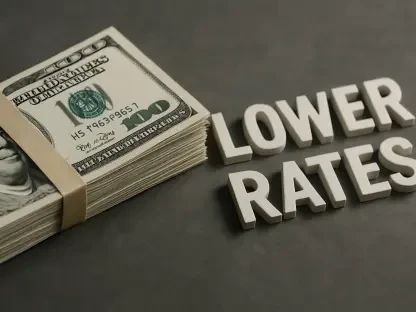In a striking display of frustration, a significant majority of New York’s business leaders have voiced deep concerns about the state’s economic trajectory, painting a grim picture of an environment stifled by high taxes, overregulation, and a perceived lack of support from government officials. A recent comprehensive report by the Public Policy Institute of New York (PPINY), titled “Blueprint for New York — Creating a Roadmap for Change,” captures this discontent through an extensive survey of industry executives. The findings reveal not just dissatisfaction but a profound sense of urgency, as many fear that without substantial reform, New York risks losing its competitive edge. This growing unrest among the business community signals a critical juncture for the state, raising questions about how policymakers will respond to these mounting grievances and whether meaningful change can be achieved to restore confidence in the economic landscape.
Economic Climate Under Scrutiny
Dismal Perceptions of State Progress
A staggering 72% of surveyed business leaders believe that New York is veering off course, a sentiment that starkly contrasts with the mere 21% who see a positive direction, according to the PPINY report. This overwhelming pessimism stems from a variety of systemic issues that have long plagued the state, including burdensome tax structures and a regulatory framework that many describe as suffocating. Only 3% of respondents feel that state officials genuinely understand and support their enterprises, while over half express the opposite view, highlighting a significant disconnect between the private sector and those in power. This lack of trust extends to representation, with just 2% believing their interests are prioritized by the state. The economic conditions themselves fare no better in the eyes of these leaders, as only a small fraction rate them positively, while nearly a quarter deem them outright poor, underscoring a pervasive sense of disillusionment.
National Rankings Paint a Bleak Picture
Adding weight to these concerns are New York’s consistently low standings in national business-friendliness assessments, which serve as a sobering benchmark for the state’s economic challenges. Reports from credible sources like CNBC place New York at the bottom for business climate, while a Chief Executive poll ranks it near last for overall business environment. The Tax Foundation’s State Tax Competitiveness Index further compounds this narrative by positioning New York at the lowest spot for the current year. These rankings are not mere numbers but reflect real barriers, such as a business tax rate that significantly exceeds the national average, placing additional strain on companies striving to grow. The consensus across these evaluations points to a state struggling to create a hospitable environment for commerce, a reality that business leaders feel acutely as they navigate daily operations under such unfavorable conditions.
Challenges and Proposed Solutions
Regulatory Overload Stifles Growth
New York’s status as the second most regulated state in the nation, surpassed only by California, emerges as a critical pain point for business leaders, with over 300,000 regulations currently in place as reported by the Mercatus Center. This figure dwarfs national averages, particularly in sectors like taxation, transportation, and labor, where the regulatory burden is especially pronounced. Industries such as waste management and healthcare bear the brunt of this oversight, with executives frequently citing the permitting process as an insurmountable hurdle akin to navigating a bureaucratic maze. The sheer volume of red tape is often described as disastrous for innovation, with many leaders arguing that it hampers their ability to expand or even maintain operations. This regulatory environment not only deters new ventures but also pushes existing businesses to consider relocation, a trend that could have long-term consequences for the state’s economic vitality.
Calls for Reform and Collaboration
Amid these challenges, business leaders have outlined clear priorities for turning the tide, emphasizing the need for reduced regulations, lower taxes, and enhanced efforts to retain companies within New York’s borders. The survey highlights additional concerns such as labor and energy costs, alongside a pressing need for reliable power supply and support for startups, which are seen as vital to future growth. Proposed solutions include a thorough review of existing regulations to ensure they are business-friendly, alongside strategies to improve financial sustainability without excessive government interference. Empowering state agencies to play a more proactive role and fostering public-private partnerships are also viewed as essential steps toward rebuilding trust. These recommendations reflect a collective desire for systemic change, with many in the business community expressing hope that a more collaborative approach could pave the way for a stronger, more competitive economic landscape.
Pathways to Recovery
Addressing Systemic Economic Barriers
The urgency for reform is palpable among New York’s business leaders, who point to high corporate tax rates and escalating operational costs as persistent barriers to success, as evidenced by the PPINY survey results. These financial pressures, coupled with construction expenses and an overall inhospitable business climate, create a challenging environment where growth feels increasingly out of reach. The frustration is not merely academic; personal accounts from executives reveal plans to expand operations outside the state, with some describing the current conditions as painful to endure. This sentiment underscores a broader narrative of missed opportunities, where the state’s policies are seen as driving away talent and investment rather than cultivating them. Addressing these systemic issues will require a concerted effort to rethink fiscal policies and prioritize economic incentives that can keep businesses rooted in New York.
Building a Future of Economic Resilience
Looking back, the dialogue surrounding New York’s economic challenges revealed a unified stance among business leaders who felt marginalized by high taxes and regulatory overreach. Their collective voice, amplified through detailed surveys and national rankings, painted a picture of a state at a crossroads. Moving forward, actionable steps must focus on creating a balanced regulatory framework that supports rather than stifles enterprise. Initiatives to lower business taxes, streamline permitting processes, and invest in infrastructure could serve as catalysts for change. Moreover, fostering open communication between state officials and the private sector stands as a cornerstone for rebuilding trust. By prioritizing these efforts, there lies an opportunity to transform New York into a beacon of economic resilience, ensuring that the concerns raised by industry leaders are not just heard but acted upon with meaningful reforms.









